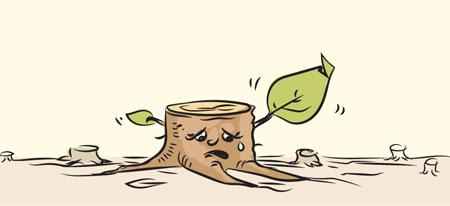22 Dec 2022 - {{hitsCtrl.values.hits}}
Seventeen per cent. That is the extent of Sri Lanka’s forest cover as of 2021. Even though Sri Lanka is promoted as a biodiversity hotspot, mainly to attract nature lovers from across the globe, the extent of deforestation is worrisome. Haphazard deforestation to clear prime locations for mega projects has left many environmentally sensitive areas in dire straits.
 One of the most recent deforestation activities has been reported from the Trikonamadu forest reserve where around 135 acres have already been cleared.
One of the most recent deforestation activities has been reported from the Trikonamadu forest reserve where around 135 acres have already been cleared.
Lands have been distributed among 22 persons to grow maize and other crops. It is estimated that a total of 1,500 acres will be cleared this way.
A similar issue was reported from Rambakan Oya sometime ago, where the land was being cleared for a maize cultivation project.
Deforestation activities have been reported from the Bogahapelessa Forest Reserve in Soragune. This reserve connects Udawalawe National Park and Soragune and is a migratory route for elephants. Already signboards have been erected claiming environmentally sensitive areas as private lands with blessings from higher officials.
Around 50,000 acres of this forest reserve have been parcelled out to influential businessmen and politicians claiming that these lands fall under the Devalagam Ordinance. Forest clearance adjacent to the Nakolagane Purana Rajamaha Viharaya in Ehetuwewa has further aggravated the human-elephant conflict in the area as this deforestation is being done along an elephant corridor.
People in Habarana, Anuradhapura, and Polonnaruwa for example have been living with the human-elephant conflict for years. They complain of an aggravating conflict as a result of haphazard deforestation activities. Elephants have a specific route to migrate from one destination to another as it serves a purpose, providing shade, food and other requirements along the way.
When the trees are cut, the elephants are deprived of shade, and food and basically they lose their already established route to reach the next destination. As a result, they come to the nearest village. Therefore most villagers perceive elephants as a threat.
It is not only elephants that people worry about. The human-leopard conflict is another problem for estate workers in the Central Highlands. The increasing number of road kills is another worrying concern. The ever-expanding road network has a detrimental impact on nocturnal animals and members of the cat family such as the fishing cat and rusty spotted cat.
However, it is ironic to note that rapid deforestation is taking place in a country that basically has its environmental laws in place. The environmentally sensitive areas in the country are being fully protected by the Flora and Fauna Protection Ordinance. Sri Lanka’s forests were subject to rapid deforestation during the previous regime and environmentalists have raised concerns over the recent incidents reported from various corners of the island.
People from rural areas scrutinized the previous government’s moves to deforest sensitive areas such as the Dahaiyagala Sanctuary. Certain cases filed against these decisions by Environmental Organisations are still being heard in courts.
Ongoing attempts to de-Gazette the Vidattaltivu Nature Reserve have come under heavy scrutiny by environmental groups. The takeover of the East Coast by foreign companies for mining and mineral exploration activities has continued over the past few years.
Sri Lanka is home to a diverse spectrum of habitats which are home to various flora and fauna. Be it a rainforest, a scrub forest, a swamp forest or any other habitat, it provides a unique environment for its flora and fauna to thrive in. Researchers continue to find various endemic species in these tiny habitats. Such endemic species add more value to our biodiversity and they turn out to be important biological indicators. These could be any species from an ant to a gecko, reptile, amphibian or any species in the animal kingdom. The same applies to the plant kingdom as well. This is why Sri Lanka is called a paradise. But if deforestation continues, all those promotional advertisements to attract tourists into the country will soon become pretty lies.
09 Jan 2025 2 hours ago
09 Jan 2025 3 hours ago
09 Jan 2025 6 hours ago
09 Jan 2025 6 hours ago
09 Jan 2025 7 hours ago